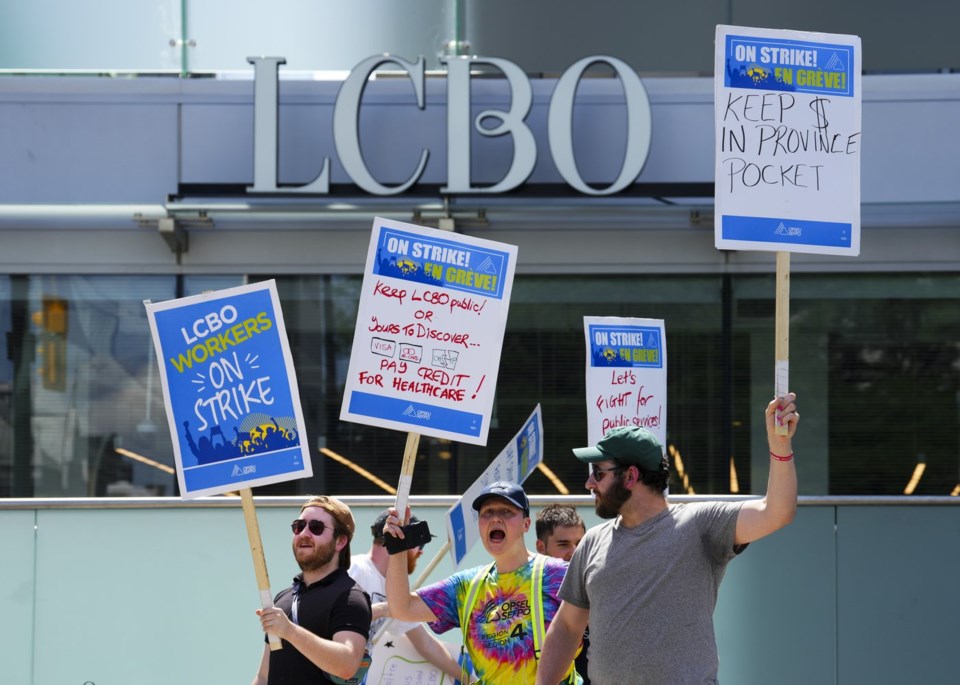TORONTO — A deal reached Friday to end a two-week-long strike at the Liquor Control Board of Ontario was thrown into question just hours after it was announced, as both sides accused each other of acting in bad faith.
Despite trumpeting a tentative agreement to end the strike earlier in the day, the union representing 10,000 workers at the LCBO said Friday afternoon that the strike would continue because the employer refused to sign a return-to-work protocol.
The LCBO fired back, saying in a statement that it would file an unfair labour practice complaint against the Ontario Public Service Employees Union.
"Earlier today, OPSEU agreed to the deal by entering into a minutes of settlement that requires a recommendation of ratification to their members," the LCBO wrote.
"They have since introduced significant new monetary demands that should have been dealt with at the bargaining table. To introduce a new set of demands after reaching a tentative agreement amounts to bad faith bargaining."
OPSEU president JP Hornick disputed that the union had "new monetary demands," but said part of their return-to-work proposals included seeking to have striking workers compensated.
"There's a number of days for which they've been out, so they should be made whole for that time, because as we know, this strike was driven by an agenda that was well beyond just this table," Hornick said.
OPSEU had said the dispute was largely about Premier Doug Ford's plan to allow convenience and grocery stores to sell ready-to-drink cocktails, saying expanded sales of the beverages will threaten their jobs.
The LCBO had said that wasn't a matter for the bargaining table and noted that its last contract offer before the strike included increases in wages, benefits and job security.
During the strike, Ford forged ahead with his alcohol expansion plans, speeding up the date when grocery stores already licensed to sell beer and wine could add the pre-mixed cocktails and coolers to their offerings. Those grocers could place orders for the beverages starting Thursday and by Friday some were already appearing on store shelves.
The strike had shuttered LCBO stores since workers walked off the job on July 5. Online orders were still being filled and the LCBO was still supplying licensees such as bars and restaurants, but those venues had said their supplies were becoming strained as the strike neared the two-week mark.
The LCBO said in a statement earlier Friday that if the tentative agreement reached was ratified, the strike would end at 12:01 a.m. Monday and stores would reopen on Tuesday.
OPSEU said earlier Friday that the union would present the details of the tentative agreement to members first, before making them public. That was originally set to happen Friday evening, but the timeline for that and for a ratification vote are now unclear.
Hornick said the strike has been difficult on the workers.
"These are not wealthy workers who are looking for like thousands of thousands of dollars each in compensation," Hornick said.
"They're looking for recognition that being on the line is a hardship, that facing down the threat of privatization and the loss of their livelihoods is a hardship. So if it is the LCBO's position that none of that should be compensated, at least put that out, so that we can deal with it as adults across a table."
The LCBO's last offer that was made public included wage increases of seven per cent over three years, a special adjustment for certain warehouse positions, improving access to benefits for casual part-timers, converting about 400 casual workers to permanent full time, and improving severance provisions.
Ford's previous plan was to get beer, wine and ready-to-drink cocktails in convenience stores and all grocery stores by 2026, but in May he announced that would instead happen this year.
Convenience stores will be allowed to sell beer, wine and coolers starting Sept. 5 while newly licensed grocery stores can do so starting Oct. 31.
An “early implementation agreement” with The Beer Store involves the province paying the company up to $225 million to help it keep stores open and workers employed. The province is also giving brewers a rebate on an LCBO fee that normally brings in $45 million a year, and it is giving retailers a 10 per cent wholesale discount.
- with files from Sharif Hassan.
This report by The Canadian Press was first published July 19, 2024.
Allison Jones, The Canadian Press

